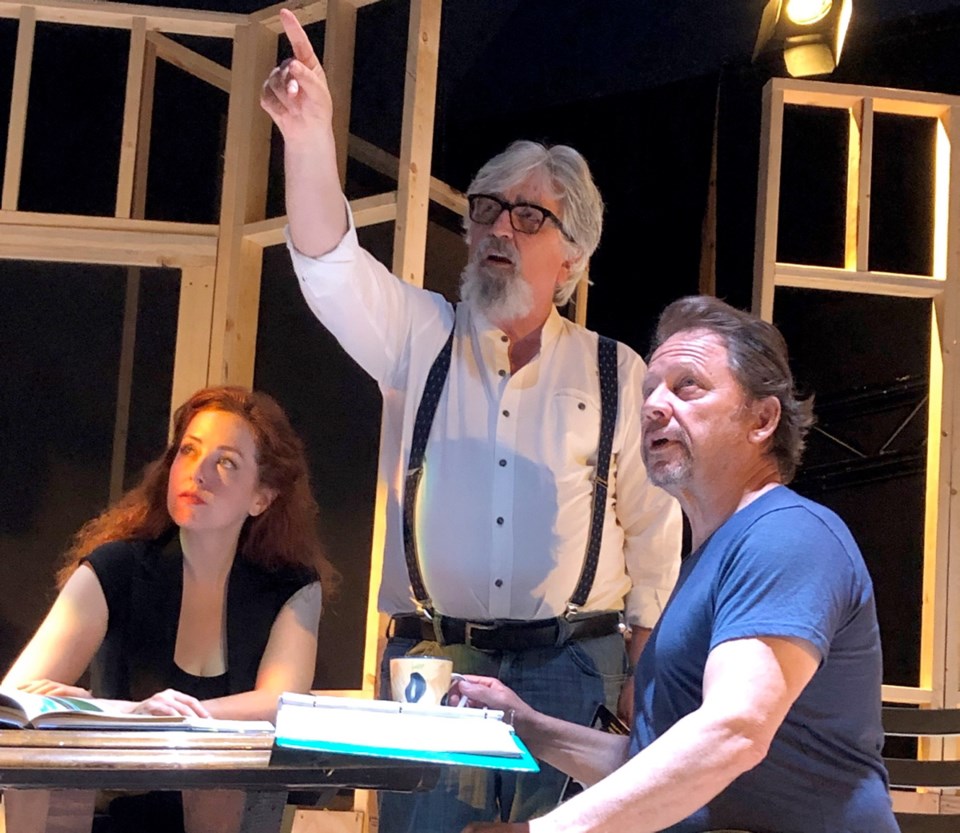ON STAGE
What: The Master Builder
Where: The Roxy Theatre, 2657 Quadra St.
When: May 28 through June 6
Tickets: $20-$48 from (250-382-3370) or in person at the Roxy Theatre box office
 A complex play about a celebrated architect in the later stages of his life who lost his children in a house fire many years before, The Master Builder is not expected to produce non-stop laughs. But that does not mean it lacks humour.
In the hands of 19th century Norwegian playwright Henrik Ibsen, The Master Builder manages to balance darkness and light with curiosity and humour. ‚ÄúThere‚Äôs a sense of human comedy, but not in a ha-ha funny way,‚ÄĚ said Brian Richmond, who is directing The Master Builder for Blue Bridge Repertory Theatre.
‚ÄúBut it also has lots of human pain and tragedy.‚ÄĚ
The play finds Halvard Solness in a state of apparent madness and suffering from a fear of falling. Though he‚Äôs a proficient architect who has designed many famous churches (Solness is the ‚Äúmaster builder‚ÄĚ of the title), he has done so without professional qualifications.
Solness believes his success is due to a sixth sense ‚ÄĒ be it the hand of God, or the handiwork of his Norwegian helpers, otherwise known as trolls ‚ÄĒ that guided him during his career. The trolls have arrived from his subconscious to assist him in achieving his aims in life, and the married man firmly believes these helpers have gotten him to an exalted place.
But after the death of his children, and the re-emergence of a young woman named Hilde Wangel, who appears to have ulterior motives, The Master Builder branches into a mix of eroticism and mysticism that could only have come from the mind of Ibsen, according to Richmond.
‚ÄúIbsen is such a good storyteller, you go for a ride right from the beginning to the end. Ambiguity is the key overriding esthetic intent of it all. You‚Äôre never quite sure what‚Äôs what. You‚Äôre not sure if all the action of the play is the young woman he met 10 years ago coming back to gain revenge, or it‚Äôs a genuine love story. It keeps itself in a wonderful balance between all those ideas.‚ÄĚ
Richmond is working with an adaptation of the Ibsen original by Sir David Hare, the Oscar-nominated British playwright. And he is doing so with what he considers the best cast and crew in Blue Bridge history: award-winning director and actor David Ferry, who plays Solness in the local production, with Stratford Festival alum Amanda Lisman in the role of Wangel (also of note, Richmond said, are sets and costumes by Graham McMonagle and original music and sound by Brooke Maxwell).
It was through Ferry that the director first discovered Ibsen, in fact. Ferry was a student at the University of Victoria when he brought The Master Builder to Richmond, who was the chairman of the school’s theatre department at the time.
They talked about working together on a version of The Master Builder, but 15 years passed before the idea came to fruition. Richmond only directs one or two productions a year at this point, so it speaks to the quality of the Ibsen original that Richmond chose this as his first directorial credit since Sweeney Todd last year.
The difficulty in directing Hare‚Äôs adaptation (which Ralph Fiennes starred in to great acclaim during a 2016 run at London‚Äôs Old Vic Theatre) was keeping the end goal in sight, Richmond said. With several interpretations available ‚ÄĒ including a 2013 feature film starring Wallace Shawn that added a few outlandish plot twists ‚ÄĒ Richmond tried to find the balance between realism and symbolism. ‚ÄúI‚Äôm trying to not move one way or the other too heavily. Because there are two aspects that are very, very evident in the text.‚ÄĚ
How does a director measure his success with a story that is so open to interpretation? Easy, according to Richmond. He knew The Master Builder would not be evaluated the same way as more straightforward productions, so he focused on presenting ideas as they were on the printed page.
‚ÄúDifferent audiences members are going to conclude different things from the end of play, and I think that‚Äôs the intention of it, quite frankly. As an audience member, you make up your own mind about what it is that‚Äôs unfolding.‚ÄĚ



